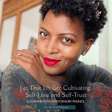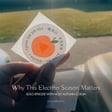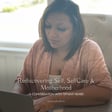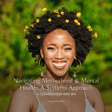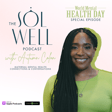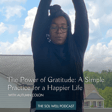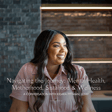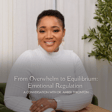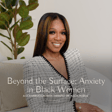Become a Creator today!Start creating today - Share your story with the world!
Start for free
00:00:00
00:00:01

Supporting New and Expectant Parents with Moradeyo Adeyi
In this episode, we dive deep into the world of pregnancy, childbirth, and postpartum support with Therapist, Birth/Postpartum Doula, and Wellness Coach Moradeyo Adeyi.
Key Takeaways:
- The importance of holistic care for expectant and new parents
- Common challenges faced during pregnancy and postpartum
- The role of a doula in supporting families
- Strategies for building resilience and creating a supportive environment
- The impact of unprocessed trauma on parenting
From the importance of preconception planning to the realities of postpartum life, we cover it all. Learn how to build a strong support system, heal from unprocessed trauma, and create a nurturing environment for your growing family.
Episode Highlights:
- The significance of postpartum mental health and the role of a doula
- Strategies for breaking generational patterns in parenting
- The importance of self-care and building resilience
- Creating a supportive community for new parents
Resources Mentioned:
Join the conversation! Share your thoughts and experiences on social media using #SolWellPodcast
Connect with Moradeyo Adeyi:
Don't forget to subscribe to Sol Well for more inspiring stories and practical advice!
Want to be a guest on the pod? Send us an email to podcast@solwell.co
Transcript
Introduction to Soul Well Podcast
00:00:05
Speaker
Welcome to the Soul Well Podcast, where moms of color find strength and community in the mental health space. Each week, we ignite inspiration as we set our intentions with affirmations and dive deep into honest conversations with fellow moms and mental health
Community and Motherhood
00:00:20
Speaker
experts. We're here to hold space for you, to shatter stigmas and elevate the voices of moms of color. We'll fight for policy change, empower you with mindful resources, and most important remind you that you're never alone on this journey. It takes a village to raise a mother. Now let's meet at the well.
Discussion on Family Planning
00:00:41
Speaker
Hey mamas, welcome back to the Sew Well podcast. I'm your host Autumn Cologne and I am back with another episode. This week we are going to be chatting about new and expectant parents and family planning with intention. My guest today is Maura Deyo Adeyi and she is a therapist and a birth post-partum doula, wellness coach, and therapist. She
Healing Generational Patterns
00:01:06
Speaker
offers a myriad of services to families in need and believes that in order to break generational patterns heal from unprocessed trauma and address impactful patterns, the work starts for starts from within. um I'm excited for this conversation today because I learned something new about how to help the new mommies in my life.
00:01:25
Speaker
um And just also, you know, how we can heal from the things that have hurt us in the past. And so um I hope you enjoy today's episode. And before we get started, I'm going to ground us in an affirmation. And so today's affirmation card says this, and I want you to repeat it after me. The secret ingredient to my success is me.
00:01:54
Speaker
One more time, the secret ingredient to my success is me. And with that, let's jump into today's episode.
Role of a Doula
00:02:04
Speaker
Hi, and welcome back to the Sew Well Podcast. I would love to welcome, welcome my guests, Mora Deyo Adehi. Welcome, welcome, welcome. Thank you so much for having me. I really appreciate it. I'm so excited for you to be here today. Um, this topic is near and dear to my heart. So I'm excited to just jump right into it. Obviously, um, this podcast, we talk all about motherhood and mental health and things that impact moms. Um, and so I'm excited for you to come on today in particular, because you are a practicing birth and postpartum doula wellness coach. Um, and just tell us a little bit more about what you do and in that realm before we jump into our our conversation today.
00:02:54
Speaker
Absolutely, I would love to. So I work full time as a mental health psychotherapist, primarily with new and expecting parents and mothers who are experiencing postpartum depression. Additionally, I also work as a person postpartum doula. I've been working with my organization Carriage House for the last year and a half. And thus far I've supported 13 families. That's lovely. and That's beautiful. Can you talk to us a little bit more about Carriage House? At the end, we're going to definitely leave resources for everyone, but can you talk to us a little bit about what that is and what you do in that practice? So Carriage House is one of the major doula organizations in New York City. I had the privilege of being trained through them
00:03:42
Speaker
last year um and ever since then all of my work has pretty much taken off. I've had the opportunity to learn more about how to support families throughout their pregnancy as well as during labor and on the big day and postpartum is something that I'm continuing to learn more about. I've had the
Postpartum Challenges and Support
00:04:02
Speaker
opportunity to support moms with their nutrition with their physical recovery as well as getting to know their families especially if they have expanded their families to you know more than one child. A lot of my clients are you know have two babies under two, so that can be quite an adjustment. So I would say I'm still learning how to best support families in that area. Yeah, absolutely. um That's great work that you do. And um we're going to get to, in the part of our conversation, talking a little bit more about the role of a doula and what that's like.
00:04:36
Speaker
um But because we are talking about um supporting support for new and expecting parents and just kind of in that postpartum journey, can you elaborate a little bit on the common challenges new parents face, both physically and emotionally? Absolutely. So I am of the belief that we don't prep enough for the postpartum period. What I found to be the most common in my work is that everyone is so focused on a healthy pregnancy, making it to full term, but we're not really paying attention to the birthing person postpartum in terms of their mental and emotional well-being.
00:05:17
Speaker
I also think that sleep deprivation tends to creep up on new parents, that after a couple days of not getting adequate sleep, it really impacts their mood, it impacts their functioning, and it can be very overwhelming in terms of how to support each other and also how to support a newborn. And so I feel like the combination of being a mental health practitioner as well as a doula is, allows me to see parents in their fullness, that it's not just about caring to term, it's more so about how are we looking at this holistically so that recovery is paramount. Yeah, absolutely. And I love that you focus
00:06:01
Speaker
And you're focusing in on that postpartum because there's so much hoo-ha and whoopla about like the pregnancy and it's a very exciting time. It's a wonderful journey. And, but also let's think about the mom that is going to now be taking care of this life and this child in a way. like you know their whole world is changing, their whole your whole life is being you know turned upside down for you know for the better. And I can just draw back on a little bit of my own experience when you talked about sleep deprivation. For me, that was a major like it was a major indicator that things were going wrong before I was um diagnosed with postpartum depression because i just I couldn't sleep because I was so anxious.
Postpartum Depression vs. Baby Blues
00:06:42
Speaker
and then like my body would shut down and I'd be sleeping while nursing, like dozing off, and that's that's not safe for me or the baby. so um I love that you talk about that. Can you talk a little bit about how postpartum depression manifests and what some of the warning signs might be for moms? Absolutely. so I think that the majority of us get postpartum depression confused with the baby blues, which are normal. in postpartum. The first two or three days, your hormones are out of whack. It's an emotional time. You are processing the fact that you brought a child into this world, which is causes a lot of trauma to the body. I would say that all of my new moms have had a level of birth trauma that looks different for every single mother. However, when we talk about postpartum depression,
00:07:41
Speaker
We're looking more for how consistent and how persistent these symptoms are manifesting in terms of sadness, anxiety, emptiness, withdrawal withdrawal from friends and family, difficulty concentrating or making decisions or thoughts of hurting yourself or your baby. And we're looking for really what's happening in the two to three weeks postpartum. now you will get a postpartum screening most folks don't know this you know six to eight weeks after giving birth however i have also given postpartum assessments and i find that they're not as thorough as they need to be and also once you've done one check
00:08:26
Speaker
kind of the end of the conversation with your provider when this should really be more of like an ongoing conversation within the first few months postpartum of how you are adjusting how you are taking care of yourself if you feel like you have enough support. Right yes absolutely absolutely and I love that you just as like this is your work also calling out that it's not enough right and how can maybe potentially we'd be doing more just in in the space to kind of really understand and to help these moms before it gets to postpartum depression, right? Like six weeks is so, like, there's so much that can happen between birth in six weeks. Um, you know, like, you know, everything that you're adjusting to, like you said, the body's going through the trauma and it's so much, and it's like, there should be some kind of continuous, you know, interaction happening. and support for for the moms, you know even just from the community that they're in or the villages around them, it's always like, what can I do for the baby? What can I do for the baby? It's like, giving birth and literally draining resources from their body to for this child?
00:09:35
Speaker
um So yeah, I love that you call attention to that because i I really hope that as we as a society continue to have these conversations and continue to raise what needs to be changed, that we start to see some of that actually be implemented. And as we fight for maternal rights, um just kind of staying like, hey, we need to be paying more attention to these issues. um
Importance of Doulas
00:09:59
Speaker
Can you talk a little bit about why or the importance of what a do a birth or postpartum doula does and how your work, just even as ah as a therapist, um supports moms and new families?
00:10:16
Speaker
Absolutely. And full transparency, before I decided to become a doula, I had never heard of a doula. I actually had a coworker introduce the idea of doulas in 2019. And I had never given it too much thought, but once I started focusing my mental health career on focusing on new and expecting parents, I recognized that as a whole, as a country, we do not support families. We essentially want everyone to have kids, but don't want to do anything to support that process, which was a shock. And so when I recognized that the importance of an advocate in the room, it really has changed how I look at family planning as a whole.
00:11:06
Speaker
As a birth doula, what I have found to be the most important is my relationship with providers, my relationship to keep the atmosphere calm, the energy positive, and also to allow the birthing person to have as much autonomy over their birth experience as possible. And I think that we have been indoctrinated into this mindset that you know the doctor knows the best, the doctor knows what they're doing, and we've forgotten that we are made to bring life into this world, that our body already knows physiologically how to do this, and that we don't trust ourselves enough to be like, that doesn't feel right. I have questions about that. I'm not sure if that intervention feels right for me.
00:11:54
Speaker
And so what I'm running into and what I've noticed in my work is that moms are so overwhelmed emotionally, families are overwhelmed that they don't have the voice to ask more questions when they're going through labor. And that to me is the most important part of being a birth doula is that I am the in-between so that you are not feeling like you have to make all of these decisions yourself at such a pivotal time with your family. And so I make it a point to know like, who is the attending nurse? Who are the attending doctors? What are their names? Do they know me?
00:12:30
Speaker
Also, what is our birth plan? If our birth plan doesn't go according to plan, what is our plan A and plan B, plan C? Does my client know all of their options in regards to having a safe and healthy birth? What does that look like? What does pain management look like? Because I'm going to tell you, hospitals are not necessarily that concerned with pain management. They're not really thinking about holistic ways to manage pain. It's more about, you know, we can give you an epidural, we can give you these drugs, etc. But that's not everybody's story. That's not what everybody wants. and So I think that it's it's really important to have someone else in the room that can be more objective.
00:13:12
Speaker
and give you all of your options so that you feel like this is the birth that I have dreamt of. And even if it isn't, I do feel like my voice was heard and that um my needs were put at the paramount. Yeah, I love that. I love that you just that last note about my voice being heard and having you know the doula be that aot like support and be that advocate for you because so often you know as women of color like we aren't being listened to our pain isn't being validated or you're over exaggerating or it's not or it's not taken as serious and so to have and like you know somebody there who's actually objective who's there with your best intentions and as well equipped and knowledgeable in the space
00:13:56
Speaker
I think it's so important for moms to to be able to to have that type of support.
Mental Health Trends in New Parents
00:14:01
Speaker
And I think that that's such a a privilege for the moms that are able to have that kind of support in the rooms with them. um And I love doulas. I wish that when I had my kids that I was able to, but I had a midwife team and I felt really, really supported, but I love that, you know, there are more black and brown um doulas that are out there now, more midwives that are black and brown that, you know, can help and to support our community in these different spaces. I want to pivot a little bit um into the um the what you're seeing
00:14:36
Speaker
um is and in terms of like mental health when it comes to new and expected parents just within your practice beyond the doula space like what are you seeing what are some common symptoms and how how can we address those well what ah has been super interesting to me is the lack of dialogue around intentional family planning prior to becoming pregnant. So what that looks like is when we talk about preconception work, we talk a lot about the fertility aspect, like what's going on with our bodies? Are we going to have trouble conceiving, et cetera? But to me, the missing piece is when we're talking about preconception, are we talking about the fact that if we are going to expand our family, that is going to change our relationship and our dynamic?
00:15:27
Speaker
Have we thought more intentionally about how we both have been parented? And what are the things that worked for us as kids and what didn't work? Also, this is 2024. So
Holistic Family Planning
00:15:40
Speaker
when we're talking about things like social media influence, when we're talking about the various challenges we're facing as a country, that is directly impacting family planning. So even when we're talking about from state to state, what are our reproductive rights in the state that we reside in? What happens if you know we can't carry to term? Do we have supports in place? What does support actually mean for us postpartum? And in the mental health space, what I've found, because I also work with individuals as well as couples, is that we're not having any of these conversations. We're having them once the baby is here,
00:16:22
Speaker
And that is causing a lot of challenges in the relationship in terms of division of labor, in terms of finances. That is a huge stressor in terms of not having enough time for intimacy. And also the fact that the baby is now the center of our universe and we have forgotten about our relationship. And so I think that my perspective and my experience is very unique because I get to work with families in so many different aspects of their family life. And what I would love to see is that we're having more intentional conversations about family planning and that we are not relying on the stories of our parents, the stories of our friends, because ultimately a child is going to change your life.
00:17:09
Speaker
yeah you need to take that responsibility and that decision very seriously, especially in these times.
Impact of Trauma on Parenting
00:17:18
Speaker
Yes, 100%. And I think that one of the um things that you draw out of that statement that I can draw out of that statement is that it's not about doing exactly what was done before or drawing on something like you said drawing on just this is what my friend is doing this is whatever it's really about intentional being intentional in the planning and also just kind of knowing and understanding like what dynamics or what family dynamics and history is going to like how that's going to play a part in raising your child
00:17:51
Speaker
which brings me to the next topic, which is about unprocessed trauma and family styles and parenting styles and mental health and how that impacts pregnancy and postpartum. What are you seeing in terms of like that unresolved and unprocessed trauma in our community as people become parents? like What are you seeing? Any trends or anything that you can call out?
00:18:15
Speaker
I always find it fascinating that with the moms that I've worked with they never had any conversations with their own mothers about their birth trauma and I find that to be so interesting because for example I have a college friend who her mother had experienced multiple miscarriages And she herself had experienced multiple miscarriages. And in my head, I was like, well, how much how much conversation were we having about that possibility prior to trying to conceive? Because I think that that is important for us to know what is what runs in our families. And then also,
00:18:59
Speaker
ah I have a ah mentor where postpartum depression was paramount in her family. And so and she had no idea until she had given birth and was struggling with postpartum depression. And in our communities, we are not talking about any of this until we are parents ourselves. And so when I feel like some of that unprocessed trauma can manifest in our own you know pregnancy experiences, it can manifest in where we process pain in our body, where we experience pain in our body.
00:19:35
Speaker
and it's too There's so much time for us to really talk about that, not just you know individually with our own families of origins, but also with our partner about what do you know about yeah your own mother's experience? What do you know what have you held on to in regards to unprocessed wounds from your own childhood? There is so much time and space for us to do that prior to deciding to conceive. And to me, it's like we're not even taking advantage of the fact that we have the tools. We have the supports that our parents didn't have to be more intentional about being the kind of parents that we may never have experienced ourselves. Yeah. Yeah. And why do you think that people aren't utilizing these tools or finding these tools at all? Like, obviously there's a change and a shift in the culture, but why aren't people like, like just,
00:20:31
Speaker
jumping and grasping onto the information that's out there to be able to change the dynamics.
00:20:39
Speaker
Well, for me, I also think that there is an absence of critical thinking. And I don't necessarily feel like that is a criticism of us as a whole. I think that even when we've talked about the changes that we are undergoing as a country, there is so much emphasis on like clickbait. There's so much emphasis on getting a story out. And there's no space for critical consciousness. And yeah I'm a person who has always liked to ask a lot of questions. And so that has been that's been really good, and sometimes it hasn't been great. But for me, is it's like, why are we not asking more questions about what's going on with our own bodies? Why are we not asking more from our partners on the kind of parents they would like to be? Why are we not thinking about what kind of parents we want to be?
00:21:32
Speaker
And to me, I started asking more questions after becoming a doula and recognizing all of the gaps in my own education. I was like, I don't even know anything about my body. Like, why don't I know anything about this? And also, how are we all having kids and none of us are talking about our experiences? that doesn't seem strange to you. yeah and yeah and And so to me, part of my calling, part of my mission is like my friends who have not had kids yet, I don't have any kids yet, but I'm hoping to have kids in the future is that we need to have more conversations about like, what are our fears? What are our anxieties? What are the things that we want to see differently in our own birth experience?
Community Support for Moms
00:22:18
Speaker
And also more emphasis on
00:22:21
Speaker
community. We don't live in a country that then emphasizes the collective. And I feel like that is such a detriment to women of color, to Black women when it comes to family planning, is that we all are suffering individually We are going through all these challenges reproductively and no one is talking. And it's like, we don't have to do this by ourselves. like well We know that we are stronger together than we are separate. And family planning, even when we think about the history of us in the world, it was never by ourselves. It was always in community.
00:22:58
Speaker
yeah Yes, 100%. That's so key and so integral in my mission and my purpose also, which is like when I first started sharing like my own experiences online, I was like, there's no Black girls talking about having anxiety and like not being able to leave their kid at home like at all or being able to like like I was so afraid to like leave my kid with his own dad to go to the walk to the mailbox like that's and I didn't see women who look like me talking about that experience and I'm like where is the community and so when I started so well it as a vision as a brainchild eight years ago before it became a thing this year it was
00:23:39
Speaker
I want to, it takes a village to raise a mother, right? We always hear it takes a village to raise a mother, but like it takes a village to raise a mother because at the end of the day, like you're saying, we were never designed to be alone. Like we we thrive in community, even back to, you know, caveman times or whatever, you know, like thinking back, like it was a unit, do you understand? And I feel like we, have gotten so separated from this this that notion when actually that is a notion that helps us to thrive and to help us to raise children that are like they they're raising communities that are just you know around them and supportive of them and we've gotten so far away from that that I'm just like how do we get that back right like how do we continue and I think it comes from
00:24:22
Speaker
us as women, millennials, and the Gen Z or whatever, like, you know, all of us that are adults now, like taking a stance and saying like, we can shift culture, we can become doulas and pour into our community and share this information. So, you know, i'm I'm glad that you came on today to kind of talk about that. And like, obviously, there's synergy with like, our both of our personal missions of like, we need to be talking about this, y'all, like, this is important stuff.
00:24:52
Speaker
Um, a yes, absolutely. Absolutely. So, um, I wanted to talk about, um, just kind of like, because we're talking about community, how, um, how moms and, um, expecting parents can create supportive environments for themselves, right? Um, how can they go about finding community or getting support, um, from those like that they want to have in their village?
00:25:21
Speaker
I think again, this also requires planning and not necessarily planning for when we are going to have the baby, right? But also thinking more intentionally about what does my village actually look like currently? also having conversations with your friends who don't have kids. Because what I also find is that friends who don't have kids don't necessarily know how to show up for their friends once they have conceived. So these are conversations that we need to be having. Like, look, even if you don't have any kids or you don't want no kids, this is what I'm going to need from you when it's time, right? Maybe that means that you are making frozen meals for me so I don't have to worry about cooking. Maybe you're coming over and you're helping tidy up the house so I don't have to.
00:26:09
Speaker
Maybe you are, I also told my friends, why are we not paying for doulas for our expecting friends? Y'all are getting them diapers and onesies. Everybody's going to get them diapers and onesies. Why don't y'all start a doula fund? you all contribute what you can contribute so that they can have a postpartum doula, they can have a birth doula. And that is at all expense that they don't have to worry about. like We need to be more even creative in how we are showing up for our friends who are who are giving birth. And I feel like that requires thought ahead of time. And then also,
00:26:50
Speaker
Recently, I've been lucky to be in circles with a lot of black and brown moms, and we've been talking more about how we need to create more support groups for us, because I can tell you in my experience, specifically in New York City, there is a lot of support groups for moms, but there are not a lot of support groups for us at all. And so that's a problem to me and I think that is there is a solution to that and part of that is What who are the moms that you know in your circle and talking to them about what they wish they had? When yeah were you know newly post postpartum? What kinds of supports do they wish were available and creating that because it's happening on the ground
00:27:36
Speaker
but we need to be a little bit more intentional about moving the needle. And so for me, it's also about like creating programming that aligns with the needs, right? So I've spent the last year working on an online program specifically for new and expecting parents to address the gaps in education. I recently launched it this month and it really talks about, you know, family trauma, it talks about attachment styles, it talks about, you know, what is it like to re-parent ourselves when we are deciding to expand our family? Because to me, these are the conversations that are going to change the trajectory of how we parent um as millennials, as Gen Zers.
00:28:25
Speaker
Absolutely, absolutely. I think that it's, um, I love that you are building this community. Like, it's like, If it doesn't exist, like it's up to, you know, it's up to us, like that old saying, like be the change you want to see in the world, right? If it doesn't exist, create this face, right? And do what you got to do. I love the idea of a doula fun. Like this is the first time I've ever heard about that because of course we're going to get a hundred million onesies and diapers and all the things and those things aren't necessary. And, but also how can we actually support you, my friend in this journey? So that way when you come home with said child,
00:29:03
Speaker
like you know you you're able to like take a deep breath or you're able to have the birth that you want to experience like we we aren't thinking about that but it's like these kinds of conversations that help to spark the conversation right in the community like oh that's actually a great idea i'm gonna share that with my friend Um, so yeah, that's so important. I love that. Um, and I love that you talked about, I'm from New York. So I, when I was, my kids were babies, you're right. There were not many support groups and I will find myself like doing like the mommy and me classes. And you know, there were never like ever any moms that looked like me to the women that looked like me were caregivers. And I'm a mom of mixed children. My kids are Afro Latina. And so.
00:29:51
Speaker
People would think that I was the nanny, and they would just straight up ask me, like, oh, like, how are the parents? I'm like, this is my kid, y'all. Like, you know, it is just always felt awkward. And so it pushed me away from wanting to be in these spaces. And so it is up to us, this generation, the generation after us, to continue to to build what isn't there. um And so I love that, that you have your practice, that you're, you know, that you're building. Is that already
Educational Programs for Parents
00:30:18
Speaker
developed, or how is that going? The course. Absolutely. So yep, the course is out. It is available for purchase. It's four modules, as I mentioned. And we really deep dive into you know attachment and culture. What does that look like for each of us? What does it look like to talk about family trauma and how that is going to influence how we parent? What does it mean to connect with our own inner child? Because I also feel like parents don't necessarily recognize that you yourself have to know how to play.
00:30:51
Speaker
in order to connect with your future kids. So if that is an area that feels very foreign to you, that means that that is work that we need to be addressing. And then I also developed, which is a freebie. So even if you don't purchase a program, The parenting deck is essentially a card game to play with new and expecting parents, asking the questions that we need to ask each other to see if we're really ready to do this. Like, how do we feel about sharing, sharing, you know, photos of our kid on social media? How do we feel about punishment? What does that look like? Do we want to give our kid allowance or not? Things that, or what are your biggest worries when it comes to becoming a parent? What are you the most excited about?
00:31:37
Speaker
So all of this is created as a gift to my folks, to us.
Open Communication in Families
00:31:46
Speaker
This is my labor of love, because I know that if we do this intentional work, we will be the parents that we didn't have. We will do this so much better, so much more intentional. Our kids will be more you know emotionally regulated because we all yeah because we thought about it. We gave it a thought. you know Yeah, yeah, 100%, 100%. And um I love that you kind of talked about this card game that actually fosters open communication, right? Like in that pre-planning stage and in the early stages, because there's so much discrepancies that you've come to find out, you know, corporal punishment or whatever, you want you know, punishment, that's taboo, you know, across the diaspora. So having those conversations is is important before you find yourself in a situation that, you know, you don't want to be in. And so that open, that fostering that open communication is essential in the family unit. But how can families navigate those lines of communications with family members who may not be open to it, right? Like if you think about, I can go from a personal experience, like I breastfed my son,
00:32:56
Speaker
but nobody and my family prior to that had breastfed. So me walking into the room and, and whipping it out and being comfortable doing that because I'm feeding my child was a topic of conversation for at the dinner table, like, Oh, you should go in the room. You should do this and here's what you should do. And it was very much up to me to kind of be educating them, you know? Um, and it felt very uncomfortable a lot of the times to have to like, to, have to fight for myself while also trying to like educate and inform and let them know like why I'm doing this and it's not sexual. I mean, it's just so much that I'm learning in our culture that we have to do. What are some ways, I guess, you know, to just kind of wrap up the question, but what are some ways to foster open communication with family members who just are not, they're just stuck in old ways?
00:33:51
Speaker
I think that part of this is also how willing we are in sharing about our own challenges reproductively. And I say that because I'll use a real example. I had a friend who was struggling with endometriosis, right? And so this has made it very challenging for her to conceive. And she only recently recognized or realized that in her family endometriosis was very common and that several of her other family members had had trouble conceiving. And I said, but if you had not been open enough to be like, hey, this is what I'm going through, and I would really like some support. You wouldn't know that all of this actually runs through all the women in your family.
00:34:36
Speaker
And so I myself, like I said, I don't have kids yet, but I have been actively talking with my mom about like what runs in our family. I have never asked her real questions about like, okay, you had a C-section with me. You had a V-back with my sister. What was that like for you? What was your recovery like? Because to me, it's not even about um not just about prepping for myself. It's also the fact that we need to put more value on expanding families in general. Because ultimately, that is how life is going to continue. That is how, as a country, we're going to progress. So why would we not be spending more time making space for families who want to expand?
00:35:22
Speaker
yeah to me it To me, that doesn't make sense. And I think that also anticipating that there's going to be pushback when you talk about what you want for yourself in family planning. Our parents come from an entirely different generation. Our our mothers did not necessarily have space to ask questions or to advocate.
Generational Differences in Family Planning
00:35:43
Speaker
It is going to look very different. We are the parents that are, there's nothing that's going to be similar. really because we are fighting inflation we are fighting internet this impending the internet this in um impending ah election z dollars you know it's a lot going on it's locked on and mom and dad did not have to
00:36:09
Speaker
face these specific difficulties. yeah So looking to them to necessarily like understand to me is more about like, let's not assume that they're going to get it. Let's just hope that we can create space to have a dialogue. And we don't have to agree. but We have to be able to start talking period. Yes, yes, we have to be able to talk period. Yes, because I think in a lot of families, and that's not true, it's not true for all families, but conversations just aren't happening. And so even to just be able to start to have that conversation is is the starting point. And that's so
00:36:47
Speaker
that's so, so, so important. And that brings me to my next topic, which is just about looking ahead and future generations, right? We're talking a lot about us and our generation and what we can do, but how can parents create a healthy environment for their children's emotional well-being as they look towards, you know, planning for the future?
00:37:08
Speaker
Well, I think in general, what I've been seeing across the board in my work is that there is a vested interest in younger generations wanting to support new and expecting moms. I actually, I teach part-time at Columbia. and I had so many students who were curious about becoming a doula and I was like there is an interest here we just need to be paying more attention to the fact that like we are moving in a space where generations want community that they want to be doing this collectively regardless of their own experiences as kids and so I think that that to me gives me a lot of hope
00:37:48
Speaker
And then additionally, my hope is with this online program, it will create more emphasis on like dialogue between couples on how to adequately prepare. And that as much as we don't want to admit that our parents have influenced us in so many ways, they do. they influence how we show up as future parents and also emotional regulation because we don't talk enough about the fact that a lot of adults are not emotionally regulated at all. And so we we need to figure that out before you are trying to bring kids into the world because our future kids
00:38:27
Speaker
The hope is that they have an understanding of their emotions. They have spaces to express their emotions. They are in an environment that feels safe and yeah loving and that we are showing them healthy ways to love, healthy ways to resolve conflict, healthy ways to advocate. And how can we do that if we haven't done our own work? Yeah, yeah. Do the inner work, do the work before they get here, right? Like get it get the work done and and focus in on, you know, like the type of environment that you're bringing your child into. And that's so key and that pre-family planning that we've been talking about. um And I think that um my next question is just going to be kind of like, you know, what are some
00:39:10
Speaker
um strategies and ways that parents can, you know, break generational patterns like within their family, um you know, once their kids are here, right? Is it showing up differently? Is it, you know, like, just any advice that you have for families looking to just do some things different?
Generational Trauma and Healing
00:39:32
Speaker
Well, you know, i I'm a mental health therapist. I do think that therapy can be very life changing, but also traditional therapy is not necessarily for everybody. And I totally am open to that. What I would love for us to utilize more is that if we are creating more spaces for new and expecting parents to support each other, that is also an avenue to talk more about like, what are you struggling with? What feels hard about being a new dad? you know what What do you need? And then also, I think that we need to create more spaces for for men to talk about their experiences. Because what I think is missing from the maternal health discourse is that we're not talking to men. And why would we not be talking to men?
00:40:21
Speaker
Like we need to and to know what are they coming from that is informing them of how to be a dad. What feels scary about becoming a father and also the The great thing to me about being a birth tool is that I also have an emphasis on working with fathers because I say, look, everyone is going to assume that you have it together because you're the man. But also, you have your own needs. You have your own emotional responses. So how are we showing up for you so that you can be the best dad you possibly can be? And maybe you don't even come from that. Maybe you didn't grow up with a dad. But those generational
00:41:02
Speaker
um that generational trauma is real. And we all know that like in our, you know, in black and brown communities, even when we think about slavery, there is so much generational trauma that is not even ours that we have continued to pass down. And so part of this is that recognize that all of this is not on us, right? Like it is not your fault that all of these things happen to you, but it is your responsibility to heal from these traumas so that you are not continuing the pattern.
00:41:36
Speaker
Ooh, yes, that's the clip, that's the bar, that's that's it right there. So you're not continuing the pattern, like it's your responsibility, sure we have these things, but it's your responsibility to say, I'm not going to continue this on, I'm gonna heal, I'm gonna work to be better, and so my children can be better. And I think that is so important, it's actually like a really good message of hope and encouragement, and just initial and activation for us just kind of like do the work so that way not if not only if not only for yourself because you should be doing it for yourself but for the generations to come after you as well that is so um that distracting me that is so important um i want to kind of close out um with just kind of some practicality for
00:42:30
Speaker
our moms, our new and expected moms, our partners, our friends, um our friends of new and expected parents. Like what um what can what can what can we do to, you know, like what's some encouragement or you know for us and what can we do to support one another?
Practical Advice for Supporting Moms
00:42:47
Speaker
Like whether you're the mom or the partner or like, you know, what is your message of encouragement?
00:42:54
Speaker
You were already doing a brave thing by working to bring life into this world. the The bare minimum from your friends, from your family, from your partner is to honor the needs that you share with them. So yeah if we if if I'm a friend and I have a friend who is pregnant, I am going to start a doula fund for you. because I feel like that makes the most sense to me in terms of showing up for you. If I'm a partner, I'm educating myself so that my partner feels like they are knowledgeable, that we both are knowledgeable about this entire process. So we're listening to the podcast. We're reading the books. We're going to the classes. We're having more conversations in our families because if it's a true partnership, that means we both are putting in work yeah to prepare for this baby. And then also it's really being aware of what maternal health looks like in this country and what reproductive rights look like in this country because we are in a very delicate space right now where everything is being stripped from us. And it's is actually a brave act to want to bring children into this world knowing that there's a lot going on.
00:44:15
Speaker
And the least that we can do for expanding families is to show up for them, whatever that looks like for them. Yes, yes, absolutely. um Whatever that looks like for them. And how can our listeners that um that are pregnant or expecting, how can how would you say they can prioritize their own well-being while also caring for their their child, either whether they're caring or their, you know, their newborn baby?
Self-Care for Parents
00:44:46
Speaker
What your baby needs is a parent that is healthy, that is present, that is aware of their own needs. And that as much as you want to be self-sacrificing, as much as you want to do everything for everyone, we know as black and brown women, everybody expects us to do everything. But what your baby needs is a mother who has cared for themselves so that you can show fully for your baby. And that if that means asking for postpartum doula, if it means asking for more time off of work, if it means asking more from your partner, this is also that you can be the parent that your baby deserves. it is not yeah This is the time for you to be selfish and ask for what you want.
00:45:31
Speaker
Yes, yes, this is the time that's so that's so key. I love that such a great um piece of advice to kind of leave for our moms, um because we hear you know we hear the quote so much that you can't pour from an empty cup and it's like I, it's so true. It's so, and I don't want it to be cliche because it is a fact, right? Like you can't give what you don't have. And so taking care of yourself is the best thing that you can do for your, for your children is taking care of you. um Now, just, so you know, with all the work that you're doing, your individual and your couples therapy and your courses and all the things, can you share with our audience just, you know, like ways that they can connect with you or work with you in your practice, like where you're practicing.
00:46:16
Speaker
anything like that, um any resources you might want to share, this is your opportunity to just kind of like, you know, let us know what you got going on and how we can connect with you. Absolutely. So if you want to see all of my offerings, you can go to legacy dash liberation dot.org So you can read all about my online program my doula services You can also book a consultation with me. I am taking on new clients Currently and then also you can follow me on my social media handles. I'm on tiktok. I'm on I Think I'm on everything tiktok Instagram um It's always em love one word
00:47:02
Speaker
And reach out to me, I'm always down to give you free resources, always down to support. Yes, yes. And all this information I'm going to leave in the show notes. So if you just click if episode show notes, there'll be links to all of this information there. um I've learned so much just kind of about caring for new and expected moms and how we can you know just meet as a friend. I'm not having any more kids. I have two. I'm done. But ah just kind of thinking about how I can support, you know how I can support my friends. um I'm definitely going to look more into doula funds and just ways, like you know like
00:47:40
Speaker
food, you know, ways to free some food or bring over, you know, caring about you, the mom as the individual. So I learned a lot. I hope that you as the listeners learned a lot. um For our bonus segment this episode, I always ask my guests to close our episode by sharing their favorite affirmation, scripture or intention. So if you have anything that um you can take a little bit of time if you need to, but I would love to kind of close out with that for our guests if you have anything.
Closing Affirmation
00:48:12
Speaker
Yes, I'm actually gonna, this is not my quote, I'm not, just a preface, but this is what has been resonating with me as I continue to expand my offerings, is no one knows what they're doing, not even the ones with degrees, big job titles, or the people on your vision board. Everyone is just trying loudly, failing loudly, and trying again, and so should you. Yes, yes. And so should you keep trying, keep thriving. And I hope you heal well. um I will see y'all next week in next week's episode. And to my guests, thank you so, so much. I appreciate you for being on here today. um And that's it. See you next week. Thank you.
00:48:58
Speaker
Hit the notification bell wherever you are listening to us today and join us next week as we delve into more mental health conversations. The Sew Well community offers a safe ground for the transformative healing and restoration of intergenerational trauma, ensuring moms of color have a space to rewrite their stories, recover, live well, be seen and heard. Join us online and on Instagram at SewWell for daily inspiration, blogs, events, and more. See you next time!
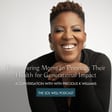
![Life after [baby] loss A conversation with Alishia Anderson image](https://media.zencastr.com/cdn-cgi/image/width=112,quality=85/image-files/61fb5028559b7100aee9f217/492cabf0-4479-488c-b19c-2873fe6bdce8.png)

